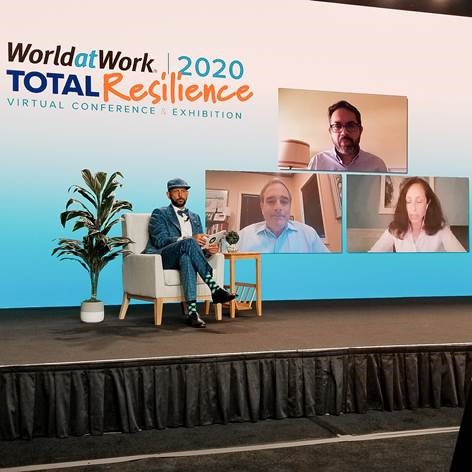Back in February, employers were keeping an eye on the novel coronavirus–which for some companies was impacting overseas operations.
Of course, things progressed fast, causing employers to react quickly, focusing on employees’ health and safety, moving workers remote and making sure operations could continue virtually. Now, months into the pandemic, workplace leaders are not only focusing on the now–they’re looking ahead to the future and rethinking policies that have the potential to change the workplace forever.

“Times of crisis and change give us permission to rethink the way we do things. It’s an opportunity to decide what really matters to your organization,” said Kumar Kymal, global head of compensation and benefits at BNY Mellon, during the opening session of WorldatWork’s Total Resilience Conference–held virtually, after coronavirus caused the cancellation of the organization’s annual in-person event.
Kymal was on a panel of benefit and compensation leaders who called in remotely to join WorldatWork CEO Scott Cawood, who moderated the panel from a stage solo, with computer screens of the panelists to his side.
“COVID-19 doesn’t define who you are,” Cawood said. “It actually reveals who you are.”
So what has COVID revealed for employers? Here are some of the biggest lessons, and predictions for the future, amid the coronavirus pandemic, according to the panel.
Recognition is key. Employee recognition has always been important, but it’s reached new levels of necessity. With employees stressed and some working harder than ever to help their employers stay financially sound during a pandemic, workers need more assurance and recognition, said Steve Pennachio, senior vice president of total rewards at Pfizer. And recognition programs and bonus programs may change and increase in prevalence and importance because of the crisis. “People want to know they are appreciated for their efforts,” Pennachio said.
Remote work will continue. Of course, the COVID outbreak prompted the vast majority of workers to work from home. That massive experiment in remote work has taught us that people can work from home even when they have other things going on, said Susan Brown, senior director of compensation at Siemens.
Looking ahead in a post-pandemic world, experts predict many workers will stay remote. More companies will shut down office space, some employees may go into an office two or three days a week, and there will be more flexibility to working schedules, Pennachio said. “The office environment will change,” he said. “Remote work is here to stay.”
Related: Twitter tells employees they can work from home ‘forever’
Remote workers may get more perks going forward. Expect more employers to offer allowances to help employees work from home, so they can set up a home office or buy the supplies they require, Siemen’s Brown said. Meanwhile, virtual gatherings or food deliveries to employees’ homes can help workers stay connected to their workplace and colleagues virtually and might be perks that grow in the future, Pennachio said.
Mental health will continue to take the spotlight. With employees nationwide struggling in a number of ways due to the pandemic, employers have noted the importance of mental health support and benefits to help them. And that focus will likely continue post-pandemic. BNY Mellon has made sure to “address the stress and anxiety that employees were experiencing,” Kymal said. The financial services firm accelerated a mental health program that helped employees deal with stress that the company was already thinking about rolling out.
“Mental health has to be paramount,” Pennachio added.
Related: Is COVID-19 a turning point for workplace mental health?
Empathy is key. Empathy–in how companies related to their employees and how employers added extra benefits to help workers through a turbulent time–was a key strategy embraced by the panelists. Pfizer extended and added benefits like wellness videos, mental health programs, bonuses and time off to volunteer, Pennachio said. BNY Mellon committed to not laying off or furloughing employees in 2020. Siemens made sure to communicate with employees and to be flexible in general. The leaders all expect that a greater emphasis on empathy will continue.
“Our company relaxed a lot of policies to help our employees,” Brown said. “Empathy led for us.”

